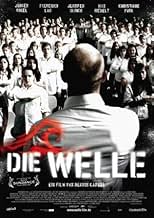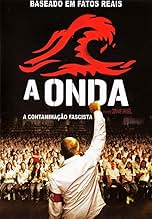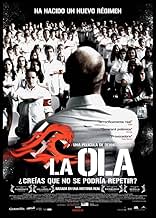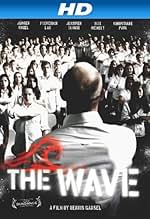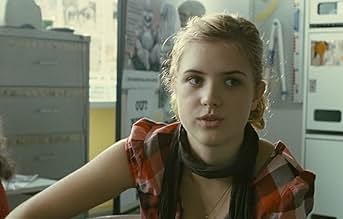VALUTAZIONE IMDb
7,6/10
119.423
LA TUA VALUTAZIONE
L'esperimento di un insegnante volto a dimostrare ai propri studenti cosa significa vivere in un regime di dittatura gli scappa terribilmente di mano quando crea un movimento sociale dotato ... Leggi tuttoL'esperimento di un insegnante volto a dimostrare ai propri studenti cosa significa vivere in un regime di dittatura gli scappa terribilmente di mano quando crea un movimento sociale dotato di vita propria.L'esperimento di un insegnante volto a dimostrare ai propri studenti cosa significa vivere in un regime di dittatura gli scappa terribilmente di mano quando crea un movimento sociale dotato di vita propria.
- Regia
- Sceneggiatura
- Star
- Premi
- 9 vittorie e 8 candidature totali
Recensioni in evidenza
How does anyone really portray autocracy and/or fascism? In most ways, it can be done in the usual one-dimensional concoction of corruption, evil deeds, extreme delusion and paranoia amongst the ruling elites of the regimes. The Wave ("Die Welle") though looks at the issue from a different angle, examining how it can arise and entrance those it touches, and in the process makes the whole issue look fresh again.
The basic story is that of a school teacher (an anarchist at heart) who has to teach a class about "Autocracy". Failing to get their attention, he decides to create an experiment whereby they are to create their own mini autocracy and rules amongst themselves (named "The Wave"). With such a controversial subject, the whole thing gets out of hand with the pupils succumbing to the autocratic fascist methodology with grave consequences.
One important point that needs to be added is that its a German movie, and for historical reasons the topic is a delicate one, yet seems to add to the whole feel. The film is quite realistically disturbing in many ways, and shows how most of the pupils slowly fall for fascism in quite innocent ways. It will make you think and possibly reassess the important question, as asked in the film, if Autocracy can rear its head again.
The writing, the acting and direction are excellent. Jürgen Vogel as the class teacher is both entertaining and thoughtful in his role, but the cast in general is exceptional especially as in the main they are mostly teenagers.
If you like thoughtful films, and wish to see something that is questioning historical events in the present, then there is little to better this. Deserves to be watched. Its a film that will definitely be spoken about and re watched by many repeatedly for many years to come.
The basic story is that of a school teacher (an anarchist at heart) who has to teach a class about "Autocracy". Failing to get their attention, he decides to create an experiment whereby they are to create their own mini autocracy and rules amongst themselves (named "The Wave"). With such a controversial subject, the whole thing gets out of hand with the pupils succumbing to the autocratic fascist methodology with grave consequences.
One important point that needs to be added is that its a German movie, and for historical reasons the topic is a delicate one, yet seems to add to the whole feel. The film is quite realistically disturbing in many ways, and shows how most of the pupils slowly fall for fascism in quite innocent ways. It will make you think and possibly reassess the important question, as asked in the film, if Autocracy can rear its head again.
The writing, the acting and direction are excellent. Jürgen Vogel as the class teacher is both entertaining and thoughtful in his role, but the cast in general is exceptional especially as in the main they are mostly teenagers.
If you like thoughtful films, and wish to see something that is questioning historical events in the present, then there is little to better this. Deserves to be watched. Its a film that will definitely be spoken about and re watched by many repeatedly for many years to come.
This is a German film (subtitled) about a school project looking at autocracy (a la Nazi Germany). In order for the teacher to persuade his pupils that autocracy remains a real threat to democracy, he persuades them to take part in a class dictatorship. The key difference between this and your average school classroom is that he convinces the pupils not just to obey but also to want his every command. Of course the project turns bad and things get scary.
What I liked about the film was that it did not treat the pupils as "just kids"; they had brains, opinions, and their own ethics too. It is not a very black and white in it's opinion, you could draw some distinct opinion from the film but I suggest that there are several different opinions that are equally as valid. It keeps you guessing what is going to happen & even deliberately misleads you.
What I liked about the film was that it did not treat the pupils as "just kids"; they had brains, opinions, and their own ethics too. It is not a very black and white in it's opinion, you could draw some distinct opinion from the film but I suggest that there are several different opinions that are equally as valid. It keeps you guessing what is going to happen & even deliberately misleads you.
This is my fourth German film and I'm digging them. Because you asked, I watched "Das Boot," "Downfall," and "Run Lola Run."
I thought "The Wave" was going to be corny. I thought it was going to be about a group of simple-minded kids following a leader because of some bromides. It wasn't that at all.
Rainer Wenger (Jurgen Vogel) was a teacher who was teaching a class on autocracy for project week. After a spit-fire discussion with the class about what autocracy is Mr. Wenger decided to do an experiment with the class. For project week only they would have to do what Mr. Wenger said. There were a few that resisted and left the class, but those who remained were all in. Slowly, we saw the evolution of a movement.
"The Wave" is the negative side of populism. I say that because the Wave, meaning the organization they formed, could easily have been something good. Mr. Wenger had his students doing very constructive and positive stuff. Who doesn't believe that there's strength in unity, who doesn't believe in equality, who doesn't believe in helping their fellow man? Plenty of organizations, religions, and movements purport similar beliefs and they are viewed as being good. It's when people use these goodly aims to form radical armies bent on purging, "cleansing," or otherwise harming those who don't think like them, that makes a movement into a gang. And if the movement is large enough to engulf an entire nation it becomes an autocracy.
"The Wave" gives food for thought. I think the larger lesson wasn't about being a part of something, I think it was about extremism. That very same group with more moderate participants could easily have been an asset to their school and their community. So I don't knock the Wave for its extremists anymore than I knock a religion for its extremists. Don't throw the baby out with the bath water.
I thought "The Wave" was going to be corny. I thought it was going to be about a group of simple-minded kids following a leader because of some bromides. It wasn't that at all.
Rainer Wenger (Jurgen Vogel) was a teacher who was teaching a class on autocracy for project week. After a spit-fire discussion with the class about what autocracy is Mr. Wenger decided to do an experiment with the class. For project week only they would have to do what Mr. Wenger said. There were a few that resisted and left the class, but those who remained were all in. Slowly, we saw the evolution of a movement.
"The Wave" is the negative side of populism. I say that because the Wave, meaning the organization they formed, could easily have been something good. Mr. Wenger had his students doing very constructive and positive stuff. Who doesn't believe that there's strength in unity, who doesn't believe in equality, who doesn't believe in helping their fellow man? Plenty of organizations, religions, and movements purport similar beliefs and they are viewed as being good. It's when people use these goodly aims to form radical armies bent on purging, "cleansing," or otherwise harming those who don't think like them, that makes a movement into a gang. And if the movement is large enough to engulf an entire nation it becomes an autocracy.
"The Wave" gives food for thought. I think the larger lesson wasn't about being a part of something, I think it was about extremism. That very same group with more moderate participants could easily have been an asset to their school and their community. So I don't knock the Wave for its extremists anymore than I knock a religion for its extremists. Don't throw the baby out with the bath water.
Die Welle details how a project on autocracy gradually leads to disastrous results. Initially without enthusiasm to teach the topic, Rainer Wegner conducts an unorthodox experiment to demonstrate to his students (equally lukewarm to start with) what life would be like under fascism. Neatly structured by days, the experiment begins with simple disciplines and grows to become an exclusive cult named "the wave" with its own uniform and salute.
Similar to his 2004 film "Before the Fall" which concerns the Nazi's seduction of youth, Dennis Gansel probes the individual psychologies that bring about uncontrollable collective movement, and how personal life is transformed by it. It offers a balanced view on an organisation like "The Wave" by enquiring whether it is a crystallisation of the students' class-free utopia (at the cost of losing individuality) or a community for those in need of belonging and empowerment.
What is frightening is that many (though not all) of them voluntarily follow the conformity through reasoning. Ironically, the mob mentality engulfing the students is what they condemn formerly; even the "anarchist" Rainer finds himself intoxicated with his increasingly idolised status.
An engaging and powerful film with a sense of humour, suspension (terror arises when the light goes off during Karo's anti-Wave poster distribution), twist (Rainer's concluding speech), believable characterisation and excellent acting (Jürgen Vogel, Max Riemelt, and Frederick Lau). Inspired by a true event in California , this intelligent film merits attention particularly because of its non-preaching and humanistic treatment of a heavy subject.
Similar to his 2004 film "Before the Fall" which concerns the Nazi's seduction of youth, Dennis Gansel probes the individual psychologies that bring about uncontrollable collective movement, and how personal life is transformed by it. It offers a balanced view on an organisation like "The Wave" by enquiring whether it is a crystallisation of the students' class-free utopia (at the cost of losing individuality) or a community for those in need of belonging and empowerment.
What is frightening is that many (though not all) of them voluntarily follow the conformity through reasoning. Ironically, the mob mentality engulfing the students is what they condemn formerly; even the "anarchist" Rainer finds himself intoxicated with his increasingly idolised status.
An engaging and powerful film with a sense of humour, suspension (terror arises when the light goes off during Karo's anti-Wave poster distribution), twist (Rainer's concluding speech), believable characterisation and excellent acting (Jürgen Vogel, Max Riemelt, and Frederick Lau). Inspired by a true event in California , this intelligent film merits attention particularly because of its non-preaching and humanistic treatment of a heavy subject.
An amiable German social sciences teacher has to teach his children about an autocratic government. The children at first seem bored, not wanting to hear any more about The Third Reich and Nazism. The teacher is surprised. "We're too knowledgeable to ever fall into something like that again," say the students. The teacher then decides to show the children what it's like to live in an autocracy, and sets up a simple experiment in class. They elect a leader (him) and he begins to instill in them (merely as an example) the virtues and practices that accompany an autocracy ("Strength through discipline", "Work as one"). The students take to it, and become obsessed with it. Soon, what was a simple classroom experiment grows to a social entity all it's own, with the teacher not sure if he can reverse the effects.
The film was very well acted and written, and was seriously creepy. It showed how - easily a society could fall into fascism, if presented to the society in the correct way. Watching the film, I understood why the students enjoyed the new system, but was also privy to the horrors that come with it. A shocking and powerful film. The way the different children reacted and how such a seemingly innocent experiment profoundly affected their lives was incredible and horrifying. Vogel gives a powerful performance as an idealistic teacher who isn't aware of the influence he has on others. Worth seeing.
The film was very well acted and written, and was seriously creepy. It showed how - easily a society could fall into fascism, if presented to the society in the correct way. Watching the film, I understood why the students enjoyed the new system, but was also privy to the horrors that come with it. A shocking and powerful film. The way the different children reacted and how such a seemingly innocent experiment profoundly affected their lives was incredible and horrifying. Vogel gives a powerful performance as an idealistic teacher who isn't aware of the influence he has on others. Worth seeing.
Lo sapevi?
- QuizBased on the novel "The Wave" by Todd Strasser (under the pen name Morton Rhue), a fictionalized account of the "Third Wave" teaching experiment by Ron Jones that took place in a Cubberley High School history class in Palo Alto, California in April 1967.
- BlooperAlthough set somewhere in western Germany, all policemen wear insignia of the state of Berlin.
- Citazioni
Rainer Wenger: So you don't think there could be another dictatorship in Germany?
Jens: No, we are too enlightened now.
- Curiosità sui creditiOpening and closing credits appear as graffiti.
- ConnessioniFeatured in Die Johannes B. Kerner Show: Episodio datato 12 marzo 2008 (2008)
- Colonne sonoreRock 'n' Roll High School
Written by Joey Ramone, Johnny Ramone and Dee Dee Ramone
Performed by EL*KE
Produced by Mirko Schaffer
©1980 WB Music Corp. and Taco Tunes
I più visti
Accedi per valutare e creare un elenco di titoli salvati per ottenere consigli personalizzati
- How long is The Wave?Powered by Alexa
Dettagli
Botteghino
- Budget
- 5.000.000 € (previsto)
- Lordo in tutto il mondo
- 32.350.637 USD
- Tempo di esecuzione
- 1h 47min(107 min)
- Colore
- Mix di suoni
- Proporzioni
- 2.35 : 1
Contribuisci a questa pagina
Suggerisci una modifica o aggiungi i contenuti mancanti





